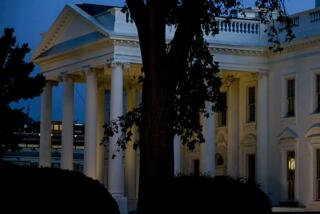4 Terror Suspects Arrested in Italy
- Share via
ROME — Italian authorities said Wednesday that they had arrested four Moroccans in possession of a plastic bag containing a cyanide compound, along with maps of Rome highlighting the U.S. Embassy and the city’s water supply system.
Italian news media said police were investigating a possible plot to poison the water in an aqueduct feeding the embassy and surrounding neighborhoods. One of the four suspects, the reports said, is believed to have ties to Osama bin Laden’s Al Qaeda terrorist network.
There were conflicting accounts, however, about whether the contents of the powder-filled bag could have harmed anyone. The bag, said to weigh nearly 9 pounds, was seized from a suburban Rome apartment Tuesday in a 4 a.m. police raid that rousted the suspects from their sleep.
Italian officials told the U.S. Embassy that the bag apparently contained potassium cyanide, easy to buy in Italy and commonly used by farmers to kill rodents. Nine pounds of potassium cyanide dissolved in a few thousand gallons of water or less could be lethal to anyone drinking it, according to Rome University pharmacologist Luciano Caprino.
U.S. officials took the report seriously. They issued a statement thanking the Italian police and security forces for “excellent work concerning the most recent security threat against the embassy.”
Later, Italian Chief Prosecutor Salvatore Vecchione said judicial police had tentatively identified the bag’s contents as potassium ferrocyanide. That compound, used to make wine and ink dye, contains small amounts of cyanide and is harmless when dissolved in water, pharmacologist Caprino said.
The prosecutor ordered further analysis of the compound but clamped a lid on new information about the case. He said Italian media reports of the arrests Wednesday had damaged the investigation, making it difficult to catch other suspects.
That didn’t stop Justice Minister Roberto Castelli from boasting that the raid demonstrated Italy’s stand “on the front line in the fight against international terrorism.”
European law enforcement officials have been worried about bioterrorism since the Sept. 11 attacks in the United States. They say they have uncovered evidence that Al Qaeda and associated groups have been gathering chemicals to manufacture poisons for assassinations and other terrorist operations.
Last year, police dismantled what they called an Al Qaeda cell near Milan and arrested seven Tunisians, who are now on trial on charges of criminal association with intent to obtain and transport arms, explosives and chemicals. In wiretapped conversations before their arrests, the defendants spoke cryptically about an unspecified “liquid” that would suffocate anyone breathing it.
Prosecutors say the alleged leader of the cell, Essid Sami ben Khemais, is suspected of--but not charged with--supervising a plot to attack the U.S. Embassy here in January 2001. Word of the plot prompted the embassy to shut down for three days that month.
At least one of the four Moroccans arrested Tuesday is linked to the busted Milan cell, Italian newspapers said. None of the four men, said to be in their 30s, was named. Two were said to be working legally as telephone operators; the others were described as illegal immigrants.
Italian state radio said police who raided the men’s apartment in Tor Bella Monaca, a southern suburb, found Arabic-language videos and agendas--which had not yet been translated by police--and about 100 blank documents used to certify that a foreigner has permission to live in Italy.
Along with up-to-date diagrams of the city’s water system, the police found a city map with the U.S. Embassy circled in red, Italian newspapers reported. Italy’s ANSA news agency said the bag allegedly containing the cyanide compound wasn’t hidden.
Police had followed the suspects for days, and their detention was related to the arrest of three other Moroccan immigrants in the same suburb last week, Italian media reported.
More to Read
Sign up for Essential California
The most important California stories and recommendations in your inbox every morning.
You may occasionally receive promotional content from the Los Angeles Times.










